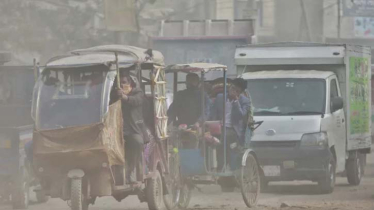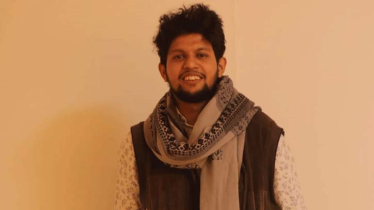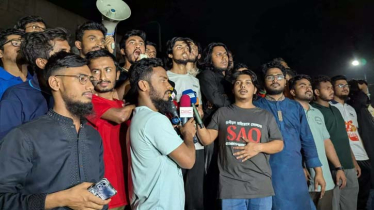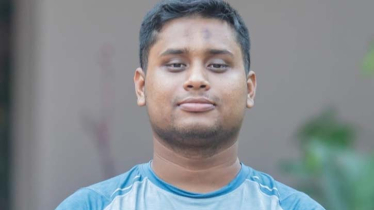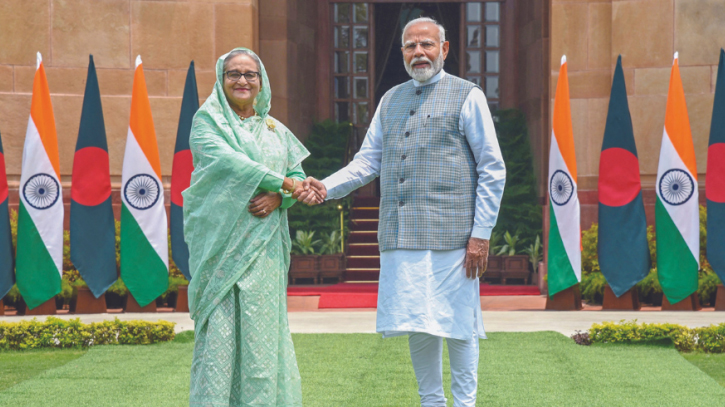
Photo: Collected
Prime Minister Sheikh Hasina on Saturday said Dhaka and New Delhi agreed on a shared vision for digital and green partnership to ensure a sustainable future for both nations. “Both countries endorsed the ‘Vision Statement’ to guide us toward a peaceful and prosperous future. We agreed to have a shared vision for digital partnership and green partnership for a sustainable suture,” she said.
She made the remarks in a joint statement before the media after a tete-e-tete and bilateral meeting with her Indian counterpart Narendra Modi, followed by the signing of several instruments at the Hyderabad House in New Delhi. “The entire gamut of binary relationship that includes sharing of water from common rivers, security and trade has prominently come for discussion during the bilateral meeting of two neighbouring countries,” Hasina said.
Describing India as Bangladesh’s major neighbour, trusted friend, and regional partner, she said, “Bangladesh greatly values the relations with of the former BNP MPs or ministers have stood by Khaleda Zia during her difficult times. At the end, Khaleda Zia is fighting alone. Her son, Tarique Rahman, who is in London, has not sent a message regarding his mother’s release. It is not only the MPs or ministers who are absent; various party organisations, lawyers, doctors, and political comrades are also mysteriously silent. There was no significant movement after Khaleda Zia’s imprisonment or even after her sentencing. Even now, as she receives critical treatment, there is no substantial movement.
The party’s approach has been limited to prayers, milad mahfils, fasting, memorandums, and symbolic gestures, requesting the government for her release from a soft position. However, the party has yet to implement a program that would exert pressure or compel her release.
In the past, even minor issues saw significant movements and actions from the party. During the last twelfth parliamentary elections, the party engaged in strikes, blockades, and non-cooperation movements for a long time to gain political advantage. Yet, such a proactive role has not been observed concerning the party chairperson’s release. Political observers note that during the 1991, 1996, and 2001 elections, many BNP MPs and ministers rose to power using Khaleda Zia’s name and image, benefiting from various government or state titles. These individuals amassed significant wealth, owning assets worth hundreds of crores of taka.
Today, these figures are known for seeking medical treatment in places like Bangkok, Singapore, London, and New York for even minor ailments, enjoying a life of luxury. The people of Bangladesh are well aware of the wealth these politicians had before 1991 and question their current silence despite having benefited so much.
This situation has left grassroots party leaders puzzled. Some within the party speculate that the lack of movement to support Khaleda Zia may be due to the influence of the BNP high command. A faction within the party believes that Tarique Rahman has centralised control, marginalising Khaleda Zia’s followers and weakening their influence within the party. This has raised questions about the party’s commitment to rallying for Khaleda Zia’s release and fighting for her cause.
Two MPs who support Khaleda Zia, speaking anonymously, revealed that after her imprisonment, numerous party members at various levels were expelled from the Gulshan office. Consequently, no one wants to jeopardise their long political careers at this stage. They aim to retire from politics with their dignity intact. While everyone understands the critical situation concerning Khaleda Zia, they are hesitant to speak out due to the influence of the party’s two high commands.
The party’s field-level leaders alleged that due to the BNP’s weak stance, their leader, Khaleda Zia, received improper treatment while in jail. As a result, her body is no longer responding to medications, or when medications are administered, other complications arise. They assert that both the government and the high command of the BNP are responsible for her current state. Despite Khaleda Zia’s critical condition, key BNP figures like Secretary General Mirza Fakhrul Islam Alamgir, Standing Committee members Khondkar Mosharraf Hossain, Mirza Abbas, and Iqbal Hasan Mahmud Tuku are seeking advanced medical treatment abroad.
Dr. AZM Zahid Hossain, Khaleda Zia’s personal doctor, stated, “Madam’s treatment is ongoing under the close observation of the medical board. Doctors are monitoring her all the time. There is nothing more to say.” He had previously expressed concerns about Khaleda Zia’s health condition, noting that complications with her liver and kidneys have become severe. He emphasised that doctors in Bangladesh have done all they can and that she needs to be taken abroad for further treatment. Mirza Abbas, a member of the party’s standing committee, expressed his regret, saying, “We lived in a fool’s paradise and did not understand; Khaleda Zia has essentially been taken to jail to be killed.”
BNP Secretary General Mirza Fakhrul Islam Alamgir stated that BNP Chairperson Khaleda Zia’s condition is ‘critical.’
He mentioned, “I visited Evercare Hospital this afternoon (Saturday) to see Madam. She is in the CCU. Her condition is critical, and doctors are not allowing anyone inside now.
The doctors will hold a board meeting again tonight, during which they will decide the next course of action.”
Messenger/Fameema





